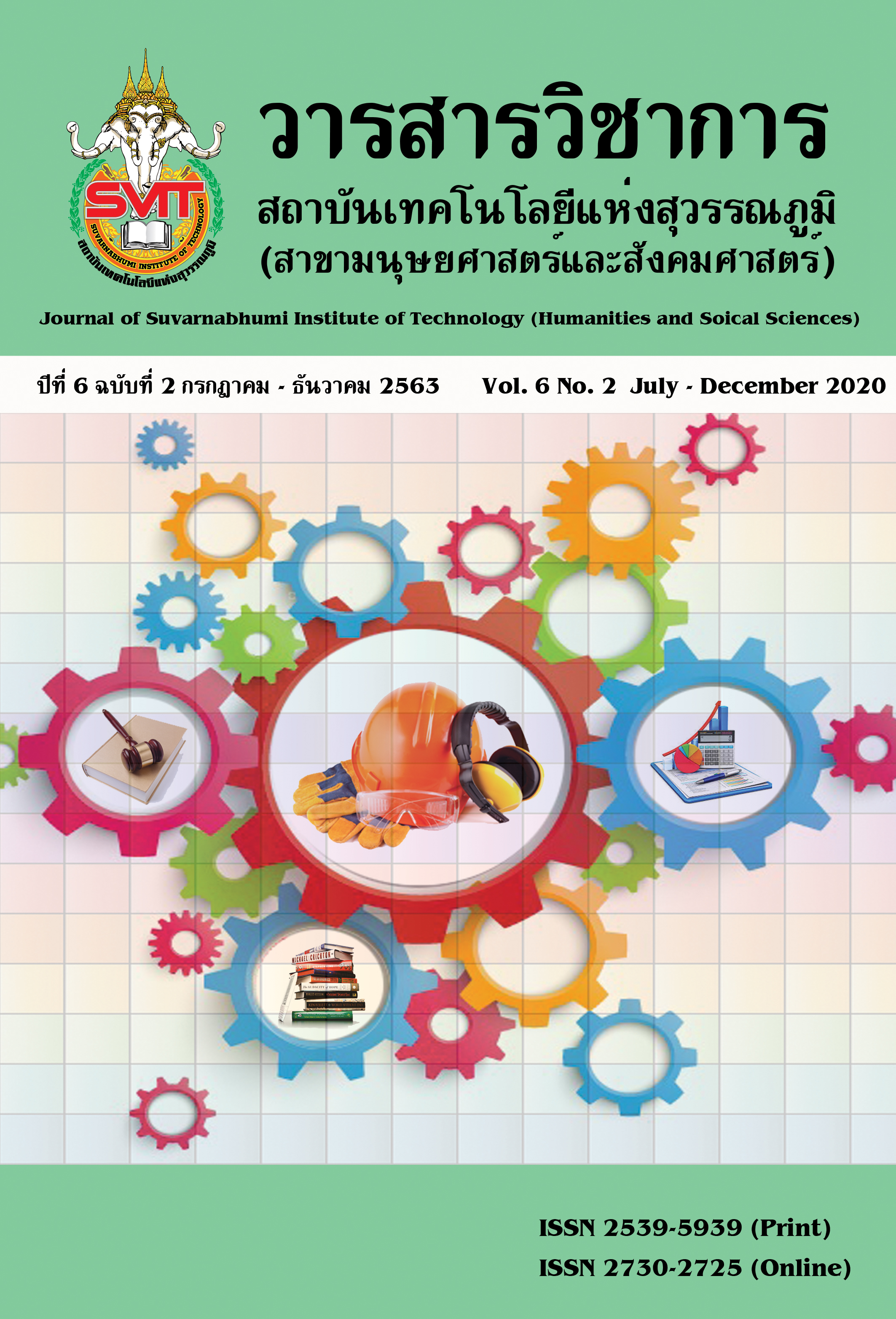TRANSFORMATIONAL LEADERSHIP EFFECTING TO THE OPERATION OF STUDENT SUPPORT SYSTEM UNDER THE SECONDARY EDUCATIONAL SERVICE AREA OFFICE 9
Keywords:
Transformational Leadership, The operation of student support systemAbstract
The purpose of this research were to study 1) The transformational leadership of school administrators 2) The school administrative of student support system 3) The Transformational leadership effecting to the operation of student support system under the Secondary educational service area office 9. The sample group consisted of 56 schools. The respondents were administrators, teachers and chairman of the board in schools under the Secondary educational service area office 9. The research instruments were three sets in 5 rating scales of questionnaires. The questionnaire has a reliability of 0.968. The statistics used for analysis were frequencies, percentage, mean, standard deviation, stepwise multiple regression analysis.
The research results were as follows:
1) The transformational leadership of school administrators were overall at a high level. The descending order that: Inspiration, Ideological influence, Consideration of individuality, Stimulating shared vision and Intellectual stimulation.
2) The operation of student support system were overall at a high level. The descending order that: Prevention, help and correction, getting to know students individually, Student screening, Promotion and development, Student forwarding.
3) Transformational leadership includes Ideological Intellectual stimulation, stimulating shared vision, Individualized Consideration, Inspiration and influence and predictive effecting to the operation of student support system under the secondary educational service area office 9 predict were efficiency at 80.70 percentile and positive correlation at .001 significant.
References
จิณณาภักดิ์ ชูหนู. (2555). ความสัมพันธ์ระหว่างภาวะผู้นำการเปลี่ยนแปลงกับการบริหารระบบดูแลช่วยเหลือนักเรียนของผู้บริหารสถานศึกษาสังกัดสำนักงานเขตพื้นที่การศึกษาประถมศึกษาสงขลา (วิทยานิพนธ์ปริญญามหาบัณฑิต สาขาวิชาการบริหารการศึกษา). สงขลา: มหาวิทยาลัยราชภัฏสงขลา.
นริศรา ปั้นบุญ. (2559). การศึกษาภาวะผู้นำการเปลี่ยนแปลงของผู้บริหารสถานศึกษาในอำเภอชุมแสง สังกัดสำนักงานเขตพื้นที่ศึกษาประถมศึกษานครสวรรค์ เขต 1 (วิทยานิพนธ์ปริญญามหาบัณฑิต สาขาวิชาการบริหารการศึกษา). นครสวรรค์: มหาวิทยาลัยราชภัฏนครสวรรค์.
นิวุธ มีพันธ์. (2559). ตัวแบบภาวะผู้นำของผู้บริหารโรงเรียนที่ได้รับรางวัลพระราชทานระดับมัธยมในเขตภาคเหนือตอนบน (ปริญญานิพนธ์ปริญญาดุษฎีบัณฑิต สาขาวิชาการบริหารการศึกษา). เชียงใหม่: มหาวิทยาลัยราชภัฏเชียงใหม่.
วรรณภา เย็นมนัส. (2557). การศึกษาปัจจัยที่มีผลต่อการดำเนินงานระบบดูแลช่วยเหลือนักเรียนของครูที่ปรึกษาโรงเรียนมัธยมศึกษาในจังหวัดพระนครศรีอยุธยา สังกัดสำนักงานเขตพื้นที่การศึกษามัธยมศึกษา เขต 3 (วิทยานิพนธ์ปริญญามหาบัณฑิต สาขาวิชาการบริหารการศึกษา). พระนครศรีอยุธยา: มหาวิทยาลัยราชภัฏพระนครศรีอยุธยา.
สรัญญา เกิดแก้ว. (2553). ความสัมพันธ์ระหว่างภาวะผู้นำการเปลี่ยนแปลงของผู้บริหารกับการบริหารจัดการระบบการดูแลช่วยเหลือนักเรียนในสถานศึกษา สังกัดสำนักงานเขตพื้นที่การศึกษานครนายก (วิทยานิพนธ์ปริญญามหาบัณฑิต สาขาวิชาการบริหารการศึกษา). ฉะเชิงเทรา: มหาวิทยาลัยราชภัฏราชนครินทร์.
สำนักงานเขตพื้นที่การศึกษามัธยมศึกษา เขต 9. (2561). คู่มือแนวทางการคุ้มครองและ ช่วยเหลือเด็กนักเรียนของสถานศึกษาสังกัดสำนักงานเขตพื้นที่การศึกษามัธยมศึกษา เขต 9. สืบค้นเมื่อ 16 กุมภาพันธ์ 2563, จาก http://www.mathayom9.go.th/ckeditor/userfiles/files/s001.pdf.
สำนักวิชาการและมาตรฐานการศึกษา, สำนักงานคณะกรรมการการศึกษาขั้นพื้นฐาน, กระทรวงศึกษาธิการ. (2552). ระบบดูแลช่วยเหลือนักเรียน หลักการ แนวคิด และทิศทางในการดำเนินงาน. กรุงเทพฯ : สำนักงานคณะกรรมการการศึกษาขั้นพื้นฐาน.
สุกัญญา พูลกสิ. (2557). ความสัมพันธ์ระหว่างภาวะผู้นำการเปลี่ยนแปลงของผู้บริหารสถานศึกษาและวัฒนธรรมการติดตามความเห็นของครูผู้สอนในสถานศึกษาสังกัดสำนักงานเขตพื้นที่การศึกษามัธยมศึกษา เขต 18 (วิทยาปริญญามหาบัณฑิต สาขาวิชาการบริหารการศึกษา). จันทบุรี: มหาวิทยาลัยราชภัฏรำไพพรรณี.
Bass, B.M., & Avolio, B.J. (1994). Improving organizational effectiveness through Transforma tional leadership. Newbury Park, CA: Sage.
Bennis, W. G., & Nanus, B. (1985). Leader : The strategies for taking change. New York: Harper & Row.
Cole, D. A. (2000). An Analysis of the Perception of the Role of High School Assistant Principal for Discipline and Supervision in Georgia School. Dissertation Abstracts International, 60(11), 3850-A.
Cook, C. W., Hunsaker, P. & Coffey, R. E. (1997). Management and organizational behavior (2nd
ed). Boston : Irwin McGraw-Hill.
Gibson,J.L., Ivanceyich, J. M., & Donnellt, J. H. (2000). Organization.behavior structure process (9th ed.) New York: McGraw-Hill.
Hoy, Wayne K., & Miskel, Cecil G. (2005). Educational Administration : Theory, Research, and Practice (7th ed.). Boston : McGraw-Hill.
Kaiser, A.F. & Posner, R.B. (2007). Transformational Leadership Make a difference. Research Technology Management .P.38
Koontz, Harold. & O’Donnell, Cyrill. (1976). Management: A Systems and Contingency Analysis of Managerial Functions. New York : McGraw-Hill.
Leithwood, K & Jantzi, D. (1996). Toward an explanation of variation in teacher’s perceptions of transformational school leadership. Educational Administration.
Peter M.Senge. (1990). The Fifth Discipline: The Art and Practice of the Learning Organization. New York: Doubleday.
Yukl, Gary A. (1998). Leadership in Organizations (4th ed.). New Jersey: Prentice-Hall.
Yukl, Gary A. (2006). Leadership in Organization. Englewood Cliffs, New Jersey: Prentice-Hall.
Downloads
Published
Issue
Section
License
The articles published are copyrighted by the Sarasas Journal of Humanities and Social Science. The opinions expressed in each article in this academic journal are those of the individual authors and do not reflect the views of Sarasas Suvarnabhumi Institute of Technology. The authors are solely responsible for all aspects of their respective articles. Any errors or inaccuracies in the articles are the sole responsibility of the authors.



